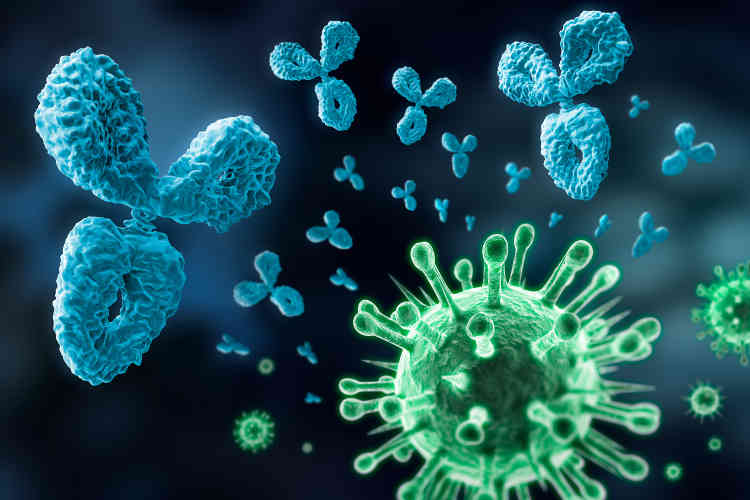What are antibodies?
Antibodies are our main form of defence in the bloodstream. They are a form of protein that is produced in response to anything foreign that gets into our bloodstream — such as viruses, bacteria, or vaccines.
What do antibodies do?
Antibodies ‘stick on’ to anything foreign that they find. If a virus tries to enter a body cell but has big globs of antibody hanging off it, the virus can be blocked from entering the cell.
As well as the passive function of sticking to viruses, some antibodies trigger a series of events which result in inflammation of the area around a cell area, making it generally inhospitable to bacteria and viruses.
Are antibodies killer cells?
No, but cruising around in our bloodstream are ‘killer’ cells called macrophages. When they bump into a cell or substance in the bloodstream, they need some kind of signal to determine whether they should engulf and destroy it — or whether it’s a part of the body. When a foreign body in the bloodstream has antibodies stuck to it, the killer cells take it as a signal that it is something to be destroyed.
Why don’t macrophages destroy hep C?
Hep C is a master of disguise. As the virus reproduces, it often changes its appearance ever so slightly. It’s a process called mutation and means hep C confuses our antibodies and macrophages, remaining one step ahead of them. Although we quickly eradicate lots of hepatitis C once it’s identified, there are always some which have mutated, are not recognised and survive our immune response.
How do hep C antibody tests work?
Hep C antibody tests are used to see if a person has ever developed hep C antibodies. If the test comes back positive, it means that HCV antibodies were found — proof that the virus has entered the bloodstream at some point in time.
If people are able to clear their hep C infection, they still keep their antibodies. Thus, a positive antibody test doesn’t always mean someone has a current infection.
To confirm whether a person has hep C or not, a PCR test is usually performed. These tests look for presence of the actual hep C virus.
What is the ‘window period’ for antibody tests?
Once a virus enters the body it takes a period of time before antibodies are produced. Thus, an antibody test carried out too soon following infection might return a false negative result.
With antibody tests, it takes up to 12 weeks to be sure the antibody test will return an accurate result. This is called the HCV antibody window period.
NB: Hep C diagnosis can be confirmed much earlier than 12 weeks by using PCR tests (which take only two weeks for an accurate test result).
NB: with babies, these window periods are: eight weeks with PCR, and 18 months with antibody tests.
What other blood tests are used?
Doctor’s will also routinely recommend liver function tests be done. These blood test looks at various substances in the blood that originate from the liver. When the substances are found in raised levels it suggests damage to liver cells and possible fibrosis.
Fibroscans are used when someone is being assessed for treatment. A fibroscan machine uses advanced ultrasound technology to assess the stiffness of your liver. It measures the speed of a vibration wave (a pulse) that is made by a probe on your lower chest overlying your liver. You hardly notice the pulse and about 10 pulses are measured, the whole examination taking around 15 minutes. The stiffer your liver, the more likely that your liver has fibrosis or cirrhosis. The scan takes only 5-10 minutes and does not involve needles or other invasive instruments.
APRI blood tests are used when someone is being assessed for treatment and Fibroscans are not available. APRI is not an actual blood test but is an online calculator that uses AST (liver function test) and platelet count. It provides an estimate of a person’s level of liver fibrosis. The score can be calculated in a couple of minutes. Patients with lower levels of fibrosis can be treated by a doctor, while patients with moderate or severe fibrosis are referred for treatment at Liver Clinics.
PCR blood tests are also commonly used. They look for the actual hep C virus and are used to see whether someone has a current infection. PCR blood tests can also measure the level of virus in the blood and are used to monitor treatment response. Further, they can also tell what hep C genotype a person has. This information can be important when considering which type of treatment someone will be offered.
To talk about anything in this factsheet, in NSW phone the Hepatitis Infoline on 1800 803 990 or go to www.hep.org.au
This factsheet was developed by Hepatitis NSW. It was reviewed by the Hepatitis NSW Medical and Research Advisory Panel.

